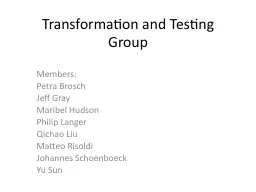PPT-Transformation of cultural and linguistic capital:
Author : trish-goza | Published Date : 2018-02-26
the struggle to be a good student Yvonne Slough Kuss AIE Conference Mumbai October 11 2014 Intercultural Understanding Reflection Responsibility and Action there
Presentation Embed Code
Download Presentation
Download Presentation The PPT/PDF document "Transformation of cultural and linguisti..." is the property of its rightful owner. Permission is granted to download and print the materials on this website for personal, non-commercial use only, and to display it on your personal computer provided you do not modify the materials and that you retain all copyright notices contained in the materials. By downloading content from our website, you accept the terms of this agreement.
Transformation of cultural and linguistic capital:: Transcript
Download Rules Of Document
"Transformation of cultural and linguistic capital:"The content belongs to its owner. You may download and print it for personal use, without modification, and keep all copyright notices. By downloading, you agree to these terms.
Related Documents














